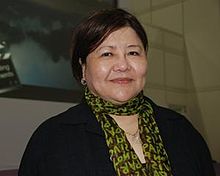This article has multiple issues. Please help improve it or discuss these issues on the talk page. (Learn how and when to remove these messages)
|
Peggy Chiao | |
|---|---|
 | |
| Born | |
| Education | University of California, Los Angeles University of Texas at Austin |
| Occupation(s) | Film producer, Professor |
| Years active | 1992–present |
| Notable work | The Hole (1998 film) Beijing Bicycle Betelnut Beauty Blue Gate Crossing Hear Me |
Peggy Chiao is a Taiwanese-Chinese filmmaker, producer, distributor, educator, juror, critic, and author. She is known internationally as the "godmother of New Taiwan Cinema".[1]
In 1997, Chiao established Arc Light Films, a production company with pan-Chinese ambition which has produced films with directors like Ann Hui, Stanley Kwan, Wang Xiaoshuai, Olivier Assayas, Yi Chih-yen, Kenny Bi and many more collaborators.
Since then, Chiao has produced critically and commercially successful films encompassing many genres and themes. Her award-winning films include Beijing Bicycle (2001), The Hole (1998), Blue Gate Crossing (2002), Drifters (2003), Green Hat (2004), Betelnut Beauty (2001), HHH: Portrait of Hous-Hsiao-Hsien (2012), Lost in Beijing (2007), Buddha Mountain (2010) and The Drummer (2007), among many others.[2] She also helped initiate the romantic comedy genre in Taiwan and China with films such as Hear Me (2009), Blue Gate Crossing (2002), Love Speaks (2013), and The Stolen Years (2013). She produced period dramas such as Empire of Silver (2009) and Lord of Shanghai (2016), and also documentaries such as Homesick Eyes (1997) and Datong: The Great Society (2011).
She has also explored web platforms with series like Finding Soul (2016), with the Chinese idol group TFBoys.
Chiao was a tireless advocate of the new talents in Taiwan, Hong Kong, and mainland China. She is one of the main reasons Hou Hsiao-Hsien, Edward Yang, Ang Lee, Wang Xiaoshuai, Tsai Ming Liang, and many other directors have been introduced to the western world. During the 1980s and 1990s, Chiao has been credited for introducing the world to New Taiwan Cinema, helping define the diverse aesthetics as well as cultural and historical themes in the movement.[3]
In 2007, she was elected as chair of the Golden Horse Film Festival,[4] for which she reformed the jury system, brought in FIPRESCI and NETPAC and established co-production meetings; helping shape Golden Horse into the world-renowned film festival as it is today. Earlier in 1990, Chiao founded the China Times Express Award, which evolved into the Taipei International Film Award.[5]
She has served as juror for many international film festivals including San Francisco, Seattle, Vancouver, Berlin, Brisbane, Sydney, Rome, Venice, San Sebastián, São Paulo, Buenos Aires, Mannheim-Heidelberg, Oberhausen, Tokyo, Fukuoka, Jeonju, Singapore, Hong Kong, Bangkok, New Delhi, Tashkent and many Chinese film festivals.
Academically, Chiao was the director of the Graduate School of Filmmaking at the Taipei National University of the Arts[6] and has been a professor there since 1985. She has taught in different universities in Taipei, Shanghai, Nanchang, and Beijing.
Chiao has published over 80 books throughout her career, some of which have been assigned as textbooks in film schools in Chinese-language territories.
- ^ Xu, Gary G. (2007). Sinascape: Contemporary Chinese Cinema. Rowman & Littlefield. p. 9. ISBN 978-0-7425-5450-4.
- ^ Chuang, Sheree. "Peggy Chiao's Lonely Trip to the Movies|International|2007-02-14|CommonWealth Magazine". CommonWealth Magazine (in Chinese (Taiwan)). Retrieved 2 April 2018.
- ^ ""'I Make Films I Feel Proud Of': Peggy Chiao and the New Chinese Cinema" by Walsh, Mike – Metro Magazine, Issue 148, Spring 2006". Archived from the original on 2018-05-07. Retrieved 2018-05-07.
- ^ "Taipei Golden Horse Film Festival". www.goldenhorse.org.tw (in Chinese (Taiwan)). Retrieved 2018-04-03.
- ^ 中時電子報. "焦雄屏把台片推向國際 熱愛變責任". 中時電子報 (in Chinese (Taiwan)). Retrieved 2018-05-04.
- ^ "Faculty|Department of Filmmaking, TNUA". filmmaking.tnua.edu.tw (in Chinese (Taiwan)). Retrieved 2018-04-03.